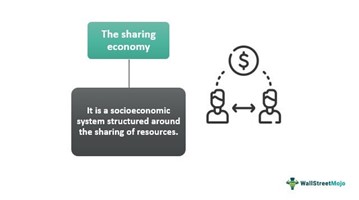nCa Report
Until recently, Sharing Economy was a rather fluffy concept. Even now, it is not fully structuralized but the experts recognize it as a fast growing sector of the global economy.
According to Nitya Shukla, writing for Business Guides, Sharing Economy (also called Collaborative Economy or Peer Economy) refers to economic activities which include owners renting out something that they are not using, or are not able to use up to complete potential, like a room, car, machinery, equipment, etc. to another party using Internet-based peer-to-peer networking.
 Kosha Mehta, in his article at WallStreetMojo, says that the sharing economy is a socioeconomic system structured around the sharing of resources and operates within the framework of capitalism. It involves various persons and entities establishing, manufacturing, distributing, selling, and consuming goods and services by leveraging IT to deliver data that allows assigning, distributing, and reusing surplus capacity.
Kosha Mehta, in his article at WallStreetMojo, says that the sharing economy is a socioeconomic system structured around the sharing of resources and operates within the framework of capitalism. It involves various persons and entities establishing, manufacturing, distributing, selling, and consuming goods and services by leveraging IT to deliver data that allows assigning, distributing, and reusing surplus capacity.
Sharing economies are vital as they allow individuals and organizations to generate revenue from underutilized assets. For example, underutilized resources like parked automobiles and extra beds can be rented out to other parties in a shared economy when they are not in use. Therefore, the exchange of tangible assets for services takes place, he writes.
The concept of shared economy, without the awareness that it is shared economy, has existed for long. The arrival of the Internet and AI has demolished the barriers. Now, any economic activity can overlap into the zone of shared economy without losing its core identity.
In Central Asia, the examples of the growing acceptance of sharing economy include the ride services that use a version of Yandex Taxi of Russia. These services work much like Uber except that the ‘surge’ in fare is not slapped if there is congestion on the roads.
The service and maintenance services that have sprung up in Central Asia are also an example of sharing economy. Someone with an aggregation software collects the information of the household appliance technicians, air-conditioning engineers, plumbers etc. and makes it available to the public in an easily searchable way. Anyone in need of a repair-person can look through the database and call the person they think can solve their issue. The provider of the software gets a small fee for their service and the main transaction is between the provider and the user of the service. There is no employer-employee relationship.
* * *
For a methodical look at the sharing economy, here is an article by Investopedia:
Sharing Economy: Model Defined, Criticisms, and How It’s Evolving
Compiled by the INVESTOPEDIA TEAM, Reviewed by GORDON SCOTT, Fact checked by KATRINA MUNICHIELLO
Updated 29 January 2024
What Is the Sharing Economy?
The sharing economy is a peer-to-peer (P2P) economic model. It facilitates acquiring, providing, or sharing access to goods and services. Sharing economies have existed throughout history, but in modern times the sharing economy is experiencing a revival with the support of community-based online platforms.
KEY TAKEAWAYS
- The sharing economy involves short-term peer-to-peer transactions to share the use of idle assets and services or to facilitate collaboration.
- Today’s sharing economy is often conducted using online platforms that connect buyers and sellers.
- The sharing economy is rapidly growing and evolving but faces significant challenges in the form of regulatory uncertainty, as well as concerns about abuses.
Understanding the Sharing Economy
Communities of people have shared assets for thousands of years. In modern times, the advent of the Internet—and its use of big data —has made it easier for asset owners and those seeking to use those assets to find each other within their communities.
The modern sharing economy is also referred to as the share economy, collaborative consumption, collaborative economy, or peer economy.
Sharing economies allow individuals and groups to make money from their underused assets, their free time, or both. In a sharing economy, idle assets such as parked cars and spare bedrooms can be rented out short term. In this way, physical assets are shared as services.
A car-sharing service like Zipcar is an example of a sharing economy service. Zipcar participants can make use of daily or hourly car rentals, with the vehicles parked close to their homes rather than at a traditional car rental agency, rather than owning a private vehicle. According to data from the Brookings Institute, private vehicles went unused for 95% of their lifetime in 2017.
The same report detailed Airbnb’s cost advantage over hotel space as homeowners made use of spare bedrooms. Airbnb rates were reported to be between 30-60% cheaper than hotel rates around the world.
How the Sharing Economy is Evolving
The sharing economy has evolved over the past few years to encompass a wide range of online economic transactions that may even include business to business (B2B) interactions.
Other platforms that have joined the sharing economy include:
- Co-Working Platforms : Companies that provide shared open workspaces for freelancers, entrepreneurs, and work-from-home employees in major cities.
- Peer-to-Peer Lending Platforms : Individuals lend money to other individuals at rates cheaper than those available from traditional lenders.
- Fashion Platforms : Individuals sell or rent their clothes.
- Freelancing Platforms : Freelance workers from writers to handymen find jobs posted by individuals or businesses.
In 2017, the Brookings Institute predicted that the sharing economy would grow from $14 billion in 2014 to a forecasted $335 billion by 2025.Those numbers increased dramatically within a few years. In 2022, Allied Market Research valued the market value of the sharing economy at $387.1 billion and projected that it would reach $827.1 billion by 2032.
Criticisms of the Sharing Economy
The sharing economy can create more economic flexibility for participants, allowing them to make extra money while at the same time decreasing the resources that each individual needs to own. However, there are criticisms of the way the sharing model has grown and changed over time.
Regulation and Government Oversight
Criticism of the sharing economy often involves regulatory uncertainty. Many of the services offered on these platforms are intended to replace industries that are highly regulated by federal, state, or local authorities, for example, taxicabs and hotels. Individuals offering short-term rental services may not be following government regulations or paying the fees. This could allow them to charge lower prices. It also opens the door to incompetent and even unscrupulous competitors.
The lack of government oversight can lead to a risk of serious abuses of buyers and sellers in the sharing economy, such as a lack of privacy or the unfair treatment of contractors. Even when laws are in place to regulate sharing platforms, those laws are not always followed.
For example, in Virginia, multiple cities and counties claim that Airbnb has avoided sharing the data necessary to determine whether it is paying the correct local and state taxes. Regulators are concerned that this lack of transparency is intended to hide information like units illegally operating as Airbnb rentals.
Bias Within Platforms
There is also a concern that information shared on an online platform can create racial and gender bias among users. This can happen when users are allowed to choose who they will share their homes or vehicles with, or because of implicit statistical discrimination by algorithms.
Moving Away From the Sharing Economy
The growth of many sharing economy services has led to a model that is organized less around sharing. Instead, contractors use sharing platforms to create full-time businesses, becoming similar to the commercial services the sharing economy was initially meant to replace.
For example, Airbnb originally encouraged hosts to rent out unused rooms in their own houses, or to rent out their houses when they were away from home. As the popularity of the service grew, however, many Airbnb units became full-time private rentals. This has led to concerns that, rather than promoting the sharing economy, Airbnb has contributed to rising housing and rental costs, as hosts buy properties to use solely as rental units. This decreases the supply of both long-term rental units and houses for sale.
The Gift Economy
The gift economy, in which participants do not charge each other money for the things they share or do, has arisen in response to perceived failures in the sharing economy. This model is organized around principles of community support and sustainable reuse.
Examples of the gift economy include:
- The Buy Nothing Project: Locally managed neighborhood groups that give or loan each other goods and services for free
- Repair cafés: Pop-up events in which volunteers help neighbors repair items or appliances rather than buying new ones
- Tool libraries: Local hubs for borrowing tools rather than owning them
- Little Free Library: A nonprofit that enables participants to create book-sharing boxes in their front yards where neighbors can leave or take books
Many public libraries also allow patrons to borrow children’s toys, tools, home appliances, and other shared items in addition to books and movies.
How Is the Sharing Economy More Environmentally Sustainable?
The sharing economy is often cited as environmentally beneficial because it allows existing resources to be used more efficiently. An Uber driver sells rides to many people who otherwise would have to buy vehicles. A co-working space provides all of the equipment and space needed for a large number of home offices.
What Is the Downside of the Sharing Economy?
Consider an alternate name for the sharing economy: the gig economy. Some of its participants appreciate the freedom and flexibility that has been made feasible as the sharing economy has grown. However, this also allows businesses to shift away from hiring full-time workers to hiring more contractors. This decreases the number of jobs available that offer stable benefits such as regular pay, health insurance, sick leave, and paid vacation time.
How Does the Share Economy Differ From the Conventional Economy?
The share economy has several distinct characteristics:
- It allows direct interaction between buyer and seller, without a retail go-between.
- It’s a short-term commitment for one job, not a contract for ongoing services.
- It stretches one person’s resources or skills to serve many others.
The Bottom Line
The sharing economy has enabled many people to live a life that is relatively independent and flexible while sharing their resources and talents with others like them. It can allow participants to make extra money by pooling unused resources, which decreases the resources that each individual needs to own.
However, there are concerns and criticisms of the sharing economy. Most peer-to-peer participants rely on access to sophisticated trading platforms to connect, and these platforms are backed by large businesses that take a big slice of the profits for themselves and may not follow government regulations. As these models evolve, many of them become full-time businesses rather than embracing the short-term sharing of resources within the community.
* * *
Sharing economy is perhaps a matter for the city and local governments to monitor and regulate. In the next part of this report we shall look at that aspect. /// nCa, 24 June 2024 [to be continued]
